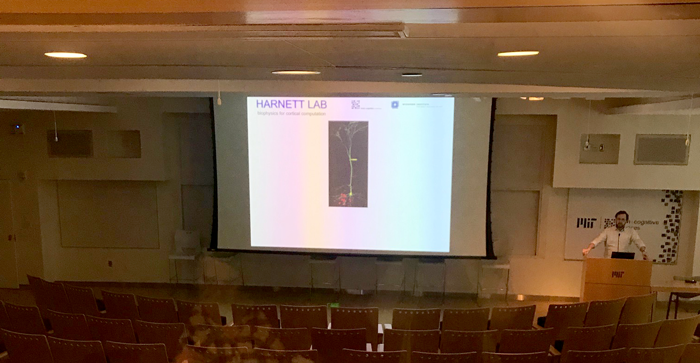Quick-change artists: turning a COVID-19 challenge into a surprising success

Prof. Mark Harnett delivers a talk to an empty Singleton Auditorium during a live-streamed portion of BCS Graduate Interview Weekend. The entire weekend was moved online with three days' notice.
It was an ominous concurrence: just as BCS faculty, staff, and grad students were preparing to welcome prospective grad students to campus for the annual Graduate Student Interview Weekend, the COVID-19 pandemic also gained momentum. Just three days before several dozen visitors were supposed to arrive, the department decided that the event had to move online.
 “Once it was clear that it was going to be fully virtual, we had a couple of emergency meetings of various grad students that were planning to be active over interview weekend to try to make virtual resources for everybody available,” says fourth-year student Joyce Wang.
“Once it was clear that it was going to be fully virtual, we had a couple of emergency meetings of various grad students that were planning to be active over interview weekend to try to make virtual resources for everybody available,” says fourth-year student Joyce Wang.
Some adjustments were straightforward. The customary “lightning” talks by faculty and grad students were live-streamed from Building 46. Faculty interviews with prospective students shifted to Skype.
Virtualizing the experience of being in the building was a much greater challenge. “The hardest thing about recreating an interview weekend experience is that you're not in that space physically,” says Gal Raz, a first-year student, who went through the building to make video lab tours. “The whole point of having lab tours was to be able to give students a sense of what the space looks like.”
“The most important thing for me during my interview before I came to BCS was feeling like I could speak candidly with current students and just get to talk about actual, real life, so that's what I focused on recreating for the virtual interview,” says first-year student Audrey Effenberger, who helped set up a Slack workspace where detailed information was shared about schedules and when current students would be available for unfiltered chats with prospective students.
Says third-year student Michael Happ, “For me the vision was that we were trying to create as many opportunities as possible for students to not just have questions answered about what life is like in the department, but also to give applicants opportunities to interact one on one with students, to see students in their more or less natural environments, to just get a sense for what we as a community are like.”
Those on the receiving end appreciated the effort. For Aida Piccato, who just graduated from Princeton, the experience sealed the deal with BCS. “I left the weekend feeling very, very confident that I made the right choice. My experience with the faculty and the students made me very comfortable in my decision to commit to the school.” Sihan Chen, an incoming graduate student from the University of Miami, also felt like he connected with the people and the program. “Everyone was very helpful, and I got to know the program a lot better. The professors were very friendly: I felt like as if I were talking to my friends. I'd never have known they're world-class researchers if I didn't know their names!”
 Senior Graduate Program Assistant Julianne Ormerod, who coordinated the weekend’s many activities, was pleased with the end result. “The most satisfying thing was hearing from the interviewees about how much they enjoyed the experience and found it highly informative. We put in our best effort because we hoped that we could show the applicants how much MIT people care, and to know that they felt cared about made it all worth it.”
Senior Graduate Program Assistant Julianne Ormerod, who coordinated the weekend’s many activities, was pleased with the end result. “The most satisfying thing was hearing from the interviewees about how much they enjoyed the experience and found it highly informative. We put in our best effort because we hoped that we could show the applicants how much MIT people care, and to know that they felt cared about made it all worth it.”
In the end, the work paid off: the program has exceeded its recruitment goals, with an incoming class that includes 67% women and 20% from under-represented minorities, compared to five-year averages of 41% and 14%, respectively. Sixty-two percent of those who were admitted chose the BCS program. Many of these incoming students will be supported by departmental fellowships, which ensure our ability to train the next generation of scientists.
Professor Matthew Wilson, chair of the graduate admissions committee, has no doubts about who to thank. “All the credit for actually pulling it off goes to Julianne and the the graduate students who really stepped up; it simply wouldn't have been possible without them. For me, the big takeaway is just the fact that they have the community here that could pull that off. It's what made it successful. But it's what also made it possible.”
Graduate students are vital to both the academic and research missions of BCS. They do much of the heavy lifting when it comes to research, and a strong graduate program is essential to attracting talented faculty. The successful transformation of this year’s interview weekend shows the benefits of having a group of students who are strong not only in intellect but in commitment to their community.

